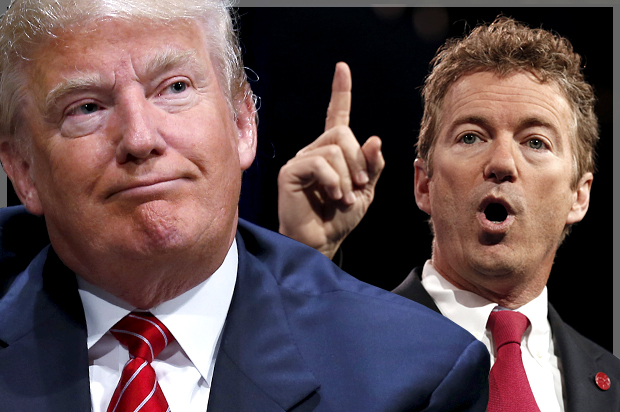Two familiar faces will be missing from the main stage when the Republican presidential candidates gather for their first debate of 2016 on Thursday night in South Carolina. Debate host Fox Business Network has banished Sen. Rand Paul and Carly Fiorina to the so-called undercard debate due to their low poll numbers.
On the surface, this makes sense. To make the primetime debate, a candidate had to be in the top six in an average of certain national polls, or the top five in an average of some New Hampshire and Iowa polls. Paul and Fiorina apparently missed both these benchmarks. More broadly, both are polling under three percent nationally, according to the Huffington Post’s poll tracker. Voting starts in three weeks and we’re getting down to the point where low-polling candidates traditionally fish or cut bait.
So Thursday night you can watch Fiorina debate fellow candidates Mike Huckabee and Rick Santorum in the undercard debate. Paul, however, has been saying for days that he would boycott the debate if he wasn’t on the main stage, and it appears he is sticking to his guns.
Sure, Paul’s tantrum over the issue is pretty hilarious. He whined that his shouldn’t be considered a minor campaign when just this week at a town hall in Exeter, New Hampshire, he had gotten a bigger crowd than Bill Clinton, who is of course not in the Republican party nor running for president. He also said, “You want war? We’ll give it to you.” Though who “you” is was unclear. The Fox Business Network? The Republican National Committee that sets up all the debates?
(Also, what will this “war” look like? The entire staff of Reason standing outside the debate hall impotently shaking their fists?)
But there is one way in which Paul makes a good point about his exclusion from the main debate. He told the Washington Post that “it’s kind of ridiculous to arbitrarily rate the campaigns based on national polling.” In this, he is correct. This is a primary, not a general election. The candidates have only campaigned in a handful of states. Voters in, say, Missouri have not been inundated with campaign ads the way they have in New Hampshire and Iowa. National polls are kind of fun, and they give us a sense of how the race is shaping up, but to exclude candidates from a debate because someone in Hannibal told a pollster who called their landline she likes that Trump fella seems, yes, ridiculous and a little arbitrary.
More broadly, this absurdity has been a problem with selecting the lineups for all the GOP debates so far, and would be for the Democratic debates as well if they had been subjected to the same capriciousness. (Martin O’Malley almost got excluded from the last debate on the basis of low polls, a move that was rightly criticized and not followed through on.)
The Republican field being as large as it is, it makes sense to try to keep the number of candidates on stage at any one time smaller so each has time to make his or her pitch to the voters. But not every candidate starts with the same level of name recognition or public profile. And yet it is this kind of public profile that gets a candidate traction in the early states, which leads to more donor money, which sustains a more robust organization that can scale up as the campaign widens from the early states to the national level.
So Rand Paul’s campaign announcement does not get nearly the same level of media coverage as Donald Trump’s. This means that even if Rand Paul has been a half-competent candidate (to be fair, reviews are mostly out on this), his campaign would still have never gained the momentum he needed to improve his poll numbers and make it onto the main stage.
To deny a struggling campaign the opportunity to make a strong pitch because all the oxygen is being sucked out of the air by a traveling carnival barker, a man whom much of his own party would like to see disappear, is unfair to both the candidate and the voters who will not get to see as much of him before making a decision. Much better to find a way to get all the candidates on stage at once. Or have some sort of system where candidates get randomly split into groups, so that the guy in last place has a shot at appearing with the guy in first, and getting in a few licks.
Another point in favor of Paul’s argument is the presence of Ohio governor John Kasich on Thursday night’s main stage. Kasich is actually polling lower than both Fiorina and Paul nationally, again according to HuffPo’s tracker. But he is doing well in New Hampshire, a state particularly suited to his brand of crusty, business-friendly Republicanism, and he is only a tick behind Ted Cruz and Chris Christie in that state.
But then, the last time Paul appeared on the main stage at a debate hosted by Fox Business Network, he birthed the only interesting moment of the entire slog. The fact that he dinged Marco Rubio, the establishment favorite for the nomination, could have sent panic through the hearts of Fox News executives. I’m not much of a conspiracy theorist – I find it tough to ascribe to malevolence what can just as easily be explained by incompetence, stupidity, or narrow-mindedness – but I don’t doubt Roger Ailes might want to keep a debate about the nature and future of conservatism from intruding on the spectacle that is this year’s content-free race. That wouldn’t make for exciting television.

